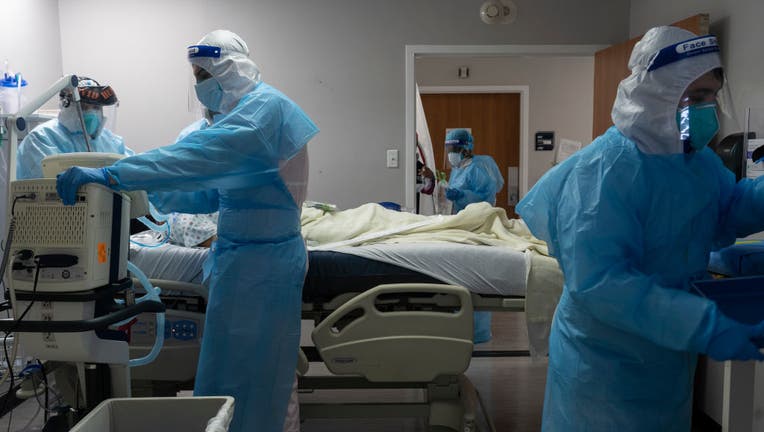Study suggests COVID-19 could negatively impact male fertility

FILE - Medical staff members treat a patient suffering from coronavirus in the COVID-19 intensive care unit (ICU) at the United Memorial Medical Center (UMMC) on November 10, 2020 in Houston, Texas. (Go Nakamura/Getty Images)
MIAMI - Researchers from the University of Miami Miller School of Medicine found that COVID-19 could impact male fertility.
In a study published in The World Journal of Men’s Health, researchers found that COVID-19 can invade testis tissue in some men who are infected with the virus.
The belief that COVID-19 could enter the male reproductive organs may indicate that the virus could be transmitted sexually, according to the study’s lead author, Dr. Ranjith Ramasamy, associate professor and director of reproductive urology at the Miller School.
Researchers analyzed testis tissue from the autopsies of six men who died of COVID-19. They found impaired sperm function in three of the men and evidence of COVID-19 that had entered the male reproductive organs.
“We also identified the presence of the virus in a man who underwent a testis biopsy for infertility but had a previous history of COVID-19. So the patient tested negative and was asymptomatic after having COVID-19 but still showed the presence of the virus inside the testes,” Ramasamy said. “This is the first published research to report on the case of a live patient to demonstrate the presence of COVID-19 in testis tissue of a patient who recovered from the virus. The finding is novel, remarkable, and certainly worthy of further exploration."
RELATED: COVID-19 vaccine timeline: A look at what’s ahead for leading candidates
According to the study, COVID-19 is drawn to the angiotensin-converting enzyme-2 (ACE-2) receptors, which are commonly found in organs such as the testes, lungs, heart, intestines and kidneys.
While traces of COVID-19 were found in the male reproductive organs of some patients, it is still uncertain if the virus can also be detected in semen, the study said.
Several other viruses, such as the mumps, are known to impact sperm and male fertility. It could be that COVID-19 works in a similar way, causing an inflammatory process, said the study’s first author, Justin K. Achua, M.S., a medical student at the Miller School.
“Mumps has been shown to enter the testes, causing inflammation of the testes and leading to impaired sperm production in about 10 to 20% of men who get infected,” Achua said. “Evaluating the autopsy findings, we saw that COVID-19 testis had signs of inflammation with white blood cells invading the testes.”
While the discovery warrants further study, researchers suggested that men who have been positively diagnosed with COVID-19 and experience testicular pain should make an appointment to see a urologist.
“Testicular pain along with other symptoms could be a sign that COVID-19 has entered the testes, and if men are thinking about fertility and/or low testosterone either at present or in the future, they should get their testosterone levels evaluated with a blood test and sperm parameters evaluated with a semen analysis,” Ramasamy said.


